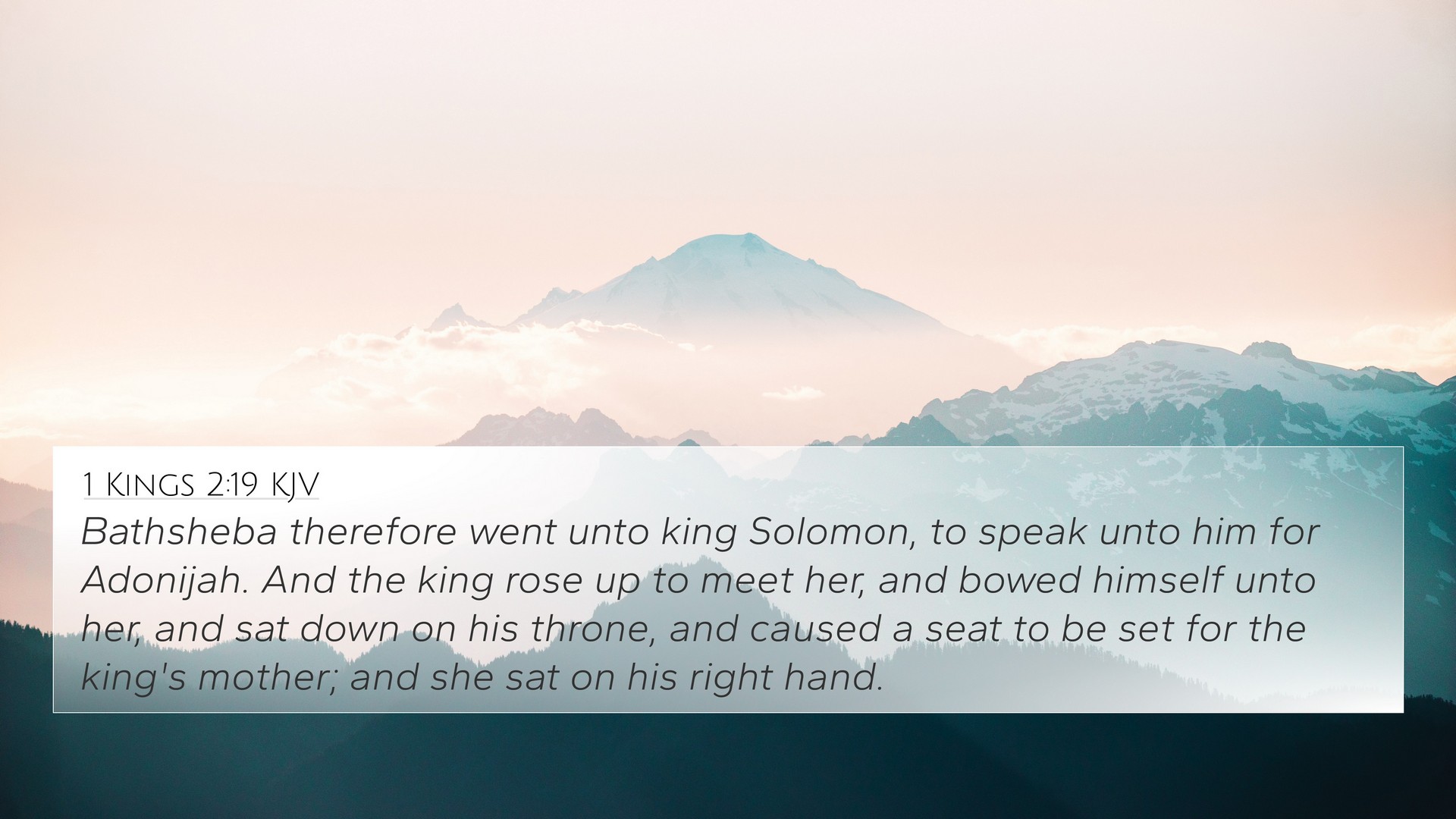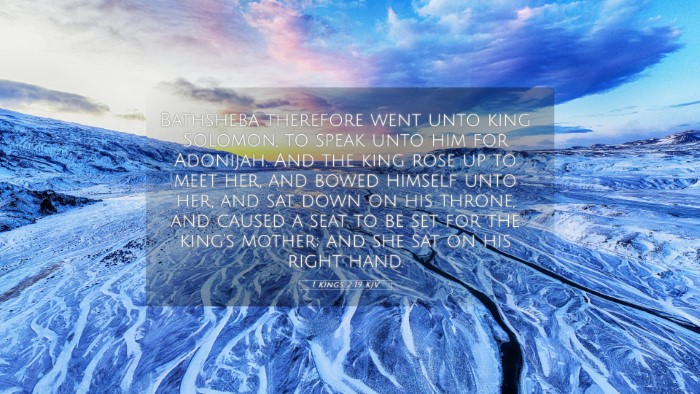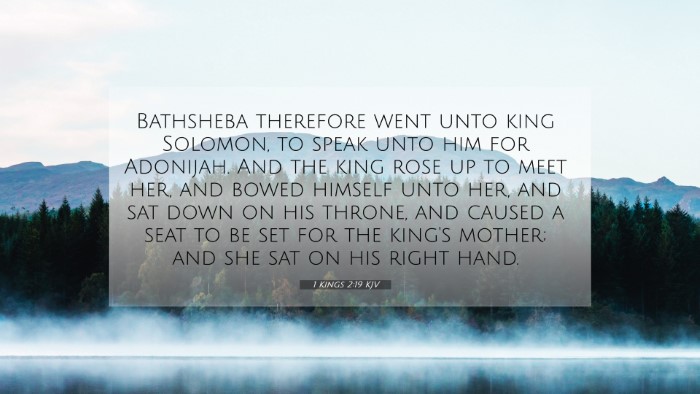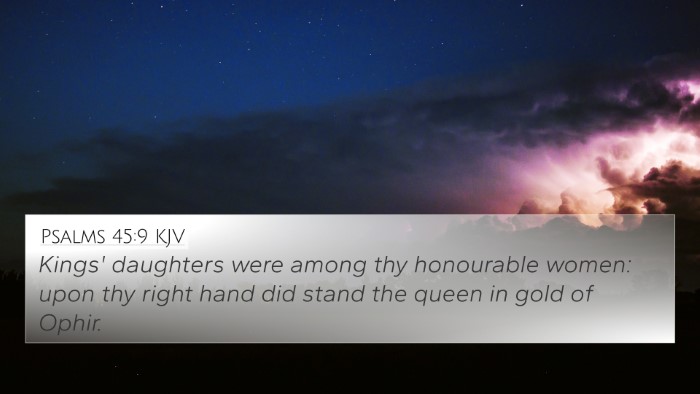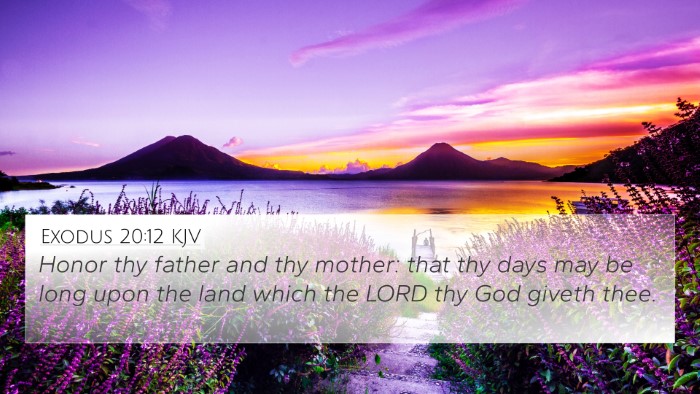Understanding 1 Kings 2:19
Verse: 1 Kings 2:19 - "So Bathsheba went to King Solomon to speak to him for Adonijah. And the king rose to meet her and bowed down to her, and sat on his throne and had a seat brought for the king's mother. And she sat on his right." (ESV)
Meaning and Interpretation
This verse captures a significant moment in the political transitions of ancient Israel, where Bathsheba, the mother of Solomon, intercedes on behalf of Adonijah, Solomon's brother. The act of rising and bowing signifies deep respect, highlighting the king's attitude towards his mother.
Contextual Analysis
The passage occurs after Solomon has been established as king, which involved political intrigue and conflict (see 1 Kings 1). Bathsheba's presence signifies her influential role in the royal court. King Solomon’s gesture aims to consolidate his authority while still respecting the traditions of his family.
Thematic Connections
- Kingship and Authority: Solomon's actions demonstrate the respect inherent in familial relationships against the backdrop of political power.
- Intercession: Bathsheba acts as a mediator; this theme is connected to other biblical figures like Esther (Esther 5:1-2) and Moses (Exodus 32:11-14) who intercede on behalf of others.
- Motherhood and Influence: The role of mothers in the Bible, as seen with Hannah (1 Samuel 1-2) and Mary, the mother of Jesus, reflects the spiritual and earthly authority vested in motherhood.
Cross-References
This verse relates to several other biblical passages, illustrating themes of authority, intercession, and familial respect. Below are relevant connections between Bible verses:
- 1 Kings 1:28-30: Solomon's ascension to the throne and Bathsheba's involvement in the royal matters.
- Proverbs 1:8: Encouragement for listening to a mother’s instruction, reinforcing her role in the family.
- 1 Samuel 2:19: Hannah's presentation of Samuel to Eli, showing the importance of mothers.
- Esther 4:16: Esther's intercession echoes Bathsheba's actions, showing a pattern of women influencing significant outcomes.
- Luke 1:39-45: Mary visiting Elizabeth, demonstrating familial connections and the influence of mothers.
- Romans 12:10: The call for honoring one another, which aligns with Solomon's respect for Bathsheba.
- Matthew 20:20-21: The request of the mother of James and John, drawing parallels between royal requests and familial pleading.
Comparative Bible Verse Analysis
In a comparative Bible verse analysis, we see how themes of respect for parents appear throughout scripture. The honor shown by Solomon may evoke Jesus's teaching in Matthew 15:4 regarding honoring one’s father and mother. This continuity in biblical themes enhances the understanding of family dynamics in faith contexts.
Importance of Cross-Referencing
Cross-referencing biblical texts allows for a deeper understanding of the roles individuals play within the lineage of faith. By identifying connections between these verses, readers can appreciate the overarching narrative regarding divine sovereignty and human agency.
Tools for Bible Cross-Referencing
- Use a Bible concordance to locate themes and phrases across different books.
- Engage with a cross-reference Bible study guide for thematic exploration.
- Explore Bible reference resources that highlight inter-textual relationships.
Conclusion
1 Kings 2:19 reveals layers of understanding concerning authority, respect, and the roles of individuals in God’s plan. By studying this verse alongside others, we uncover the richness of biblical themes that underscore the importance of familial relationships and the capacity for intercession.
